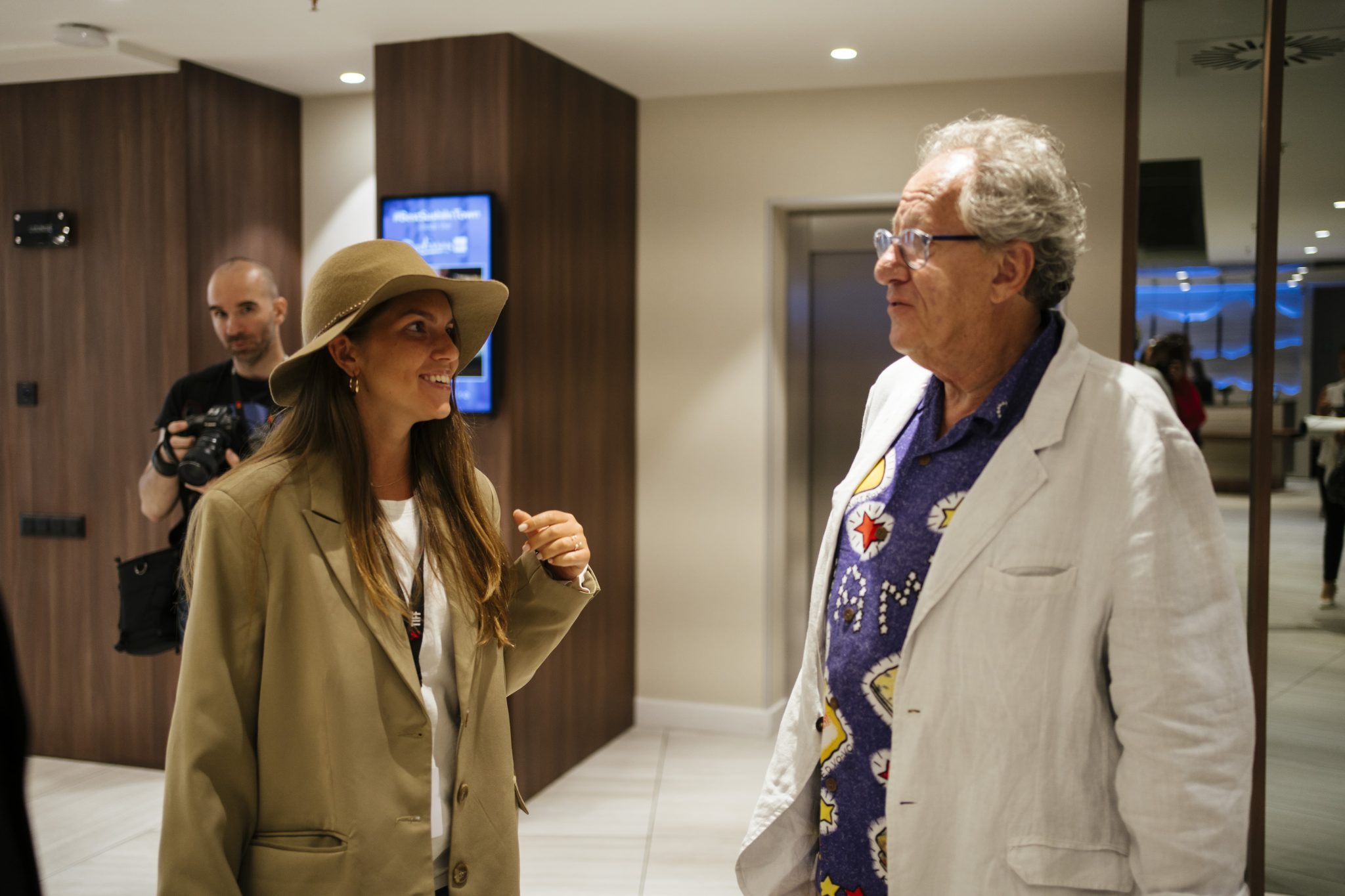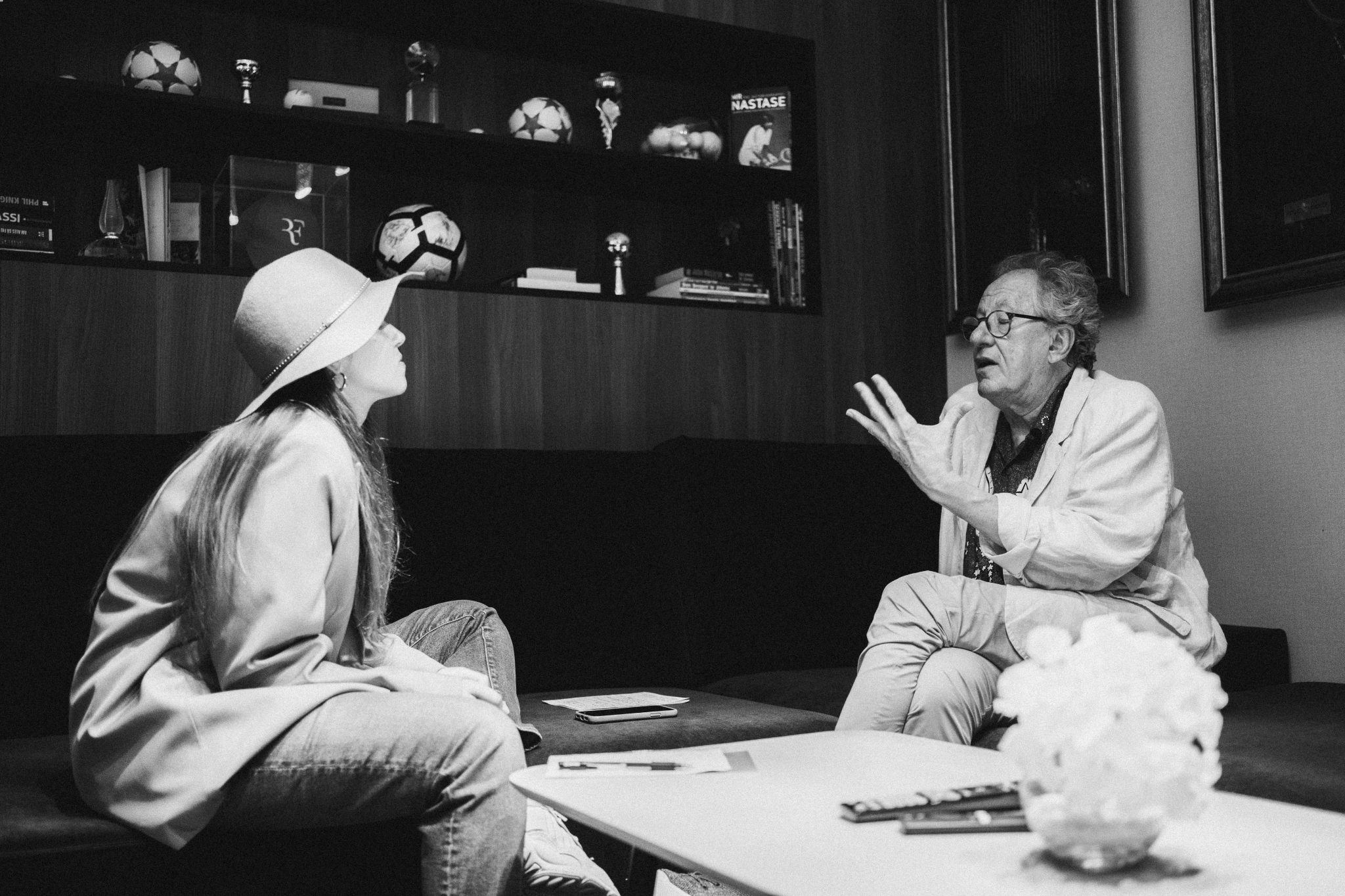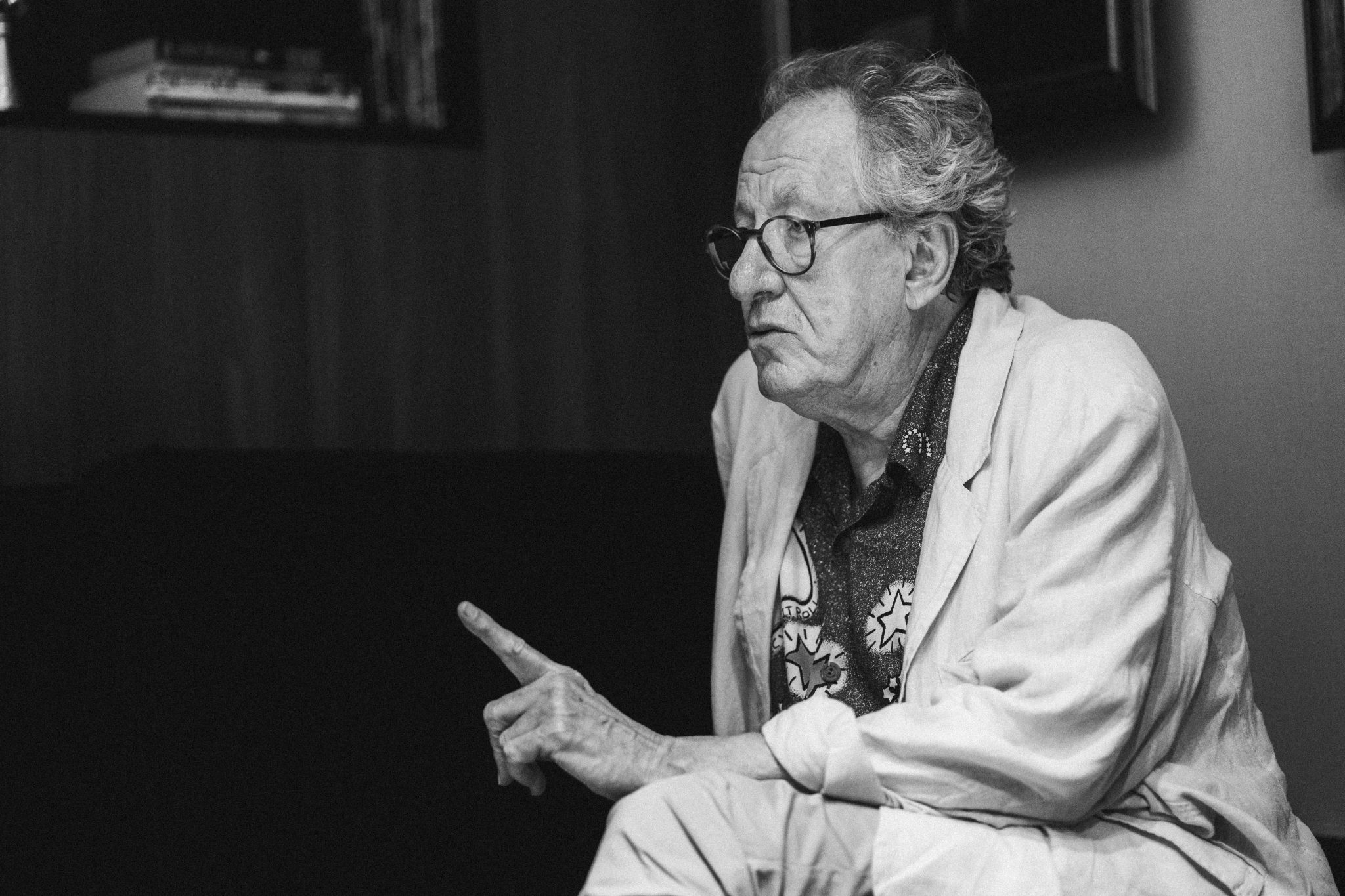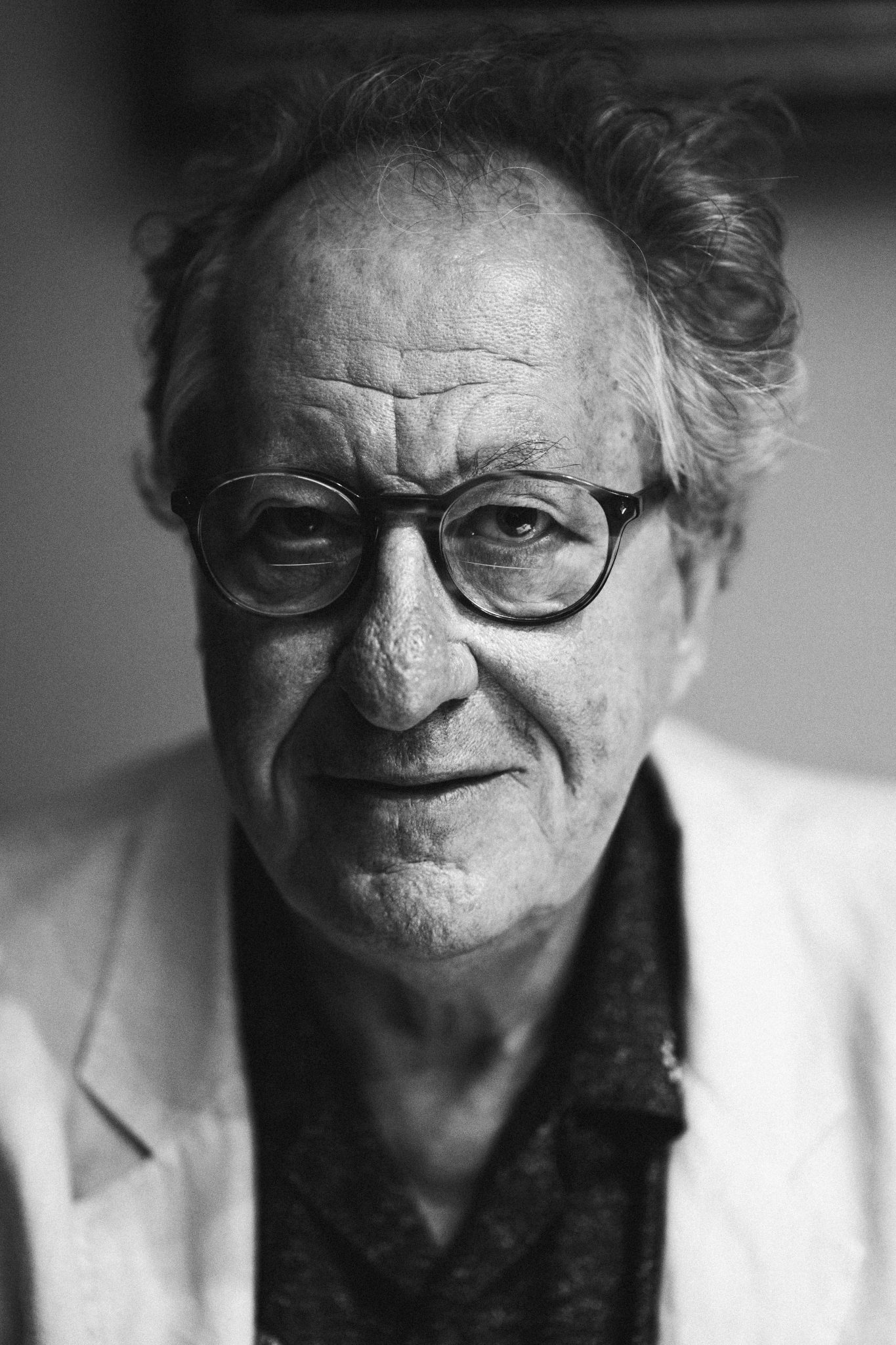Geoffrey Rush: “I don’t know how cinema will look like in five or ten years.”
I got a call from Tudor Giurgiu about two weeks before TIFF asking me if I want to moderate a masterclass with Geoffrey Rush. There was no hesitation in my answer.
I remember watching every weekend Shakespeare in Love when I was just 9, mesmerized. Then came Pirates of the Caribbean, Quills and eventually The King’s Speech. Each time his characters fascinated me, there was something in the way he immersed into them, the way he became them. His acting was always flawless, there wasn’t anything you could say against his way of approaching his performances. I remember how I always judged a film just by seeing his name on the poster, before buying a ticket. Each film he played in was far better because of him.
Fast-forward to June 2023, when I met the person. It was a rainy Thursday morning in Cluj and I was waiting for him on a sofa, somewhere in the corner of the place where his masterclass was about to happen. Someone from the festival came to invite me to his table in the next-door-restaurant. He was wearing a very colorful purple shirt, something I would buy for my boyfriend from a summer-ish island vintage store. He cracked the ice with a joke and that’s when I realized he is as lively and fun as his shirt is. We talked a little bit about myself, he was curious to get to know me before we delve right into the dynamics of the masterclass that was about to begin. One day later, we met for this short but insightful interview. I took my hat with me, hoping I will get a chance at a joke now that I know he has a good sense of humor. I was waiting patiently in line for my turn when he came out of the interview booth and straight to me, giving me a big hug, the kind you give to some old friend you haven’t seen in a while. And there it was, my chance at a tiny little joke before stepping into the interview booth, the place where I was about to talk to him for the very last time while in Cluj.

Two days spent around him and a lot of gratitude bumping through my veins. Looking back, the person is just as good as the actor, if not even better. There’s a lot of things to say about him but what I mostly appreciated was his patience, his humor and his humbility. He was not even for a single moment THE Geoffrey Rush, one of the few actors who have won an Emmy, an Oscar and a Tony Award – not to mention all of the others. He was just Geoffrey – the father of James and Angelica, husband of Jane, and a tourist in Cluj who was so excited about his days in the city, enjoying every moment of his trip until the very end.
Here’s an interview taken in two phases with probably one of those rare international stars that manage to remain human, no matter what.
Do you remember young Geoffrey, who played with Mel Gibson in Waiting for Godot?
Oh yes, I do.
How were you back then?
We were both very young – I was 28 and he was 23. We shared a house in the suburbs. We had no furniture, just a huge bag of carrots and a blender, but we used to sit in that house and rehearse a lot. It was part of a graduation course for the National Institute for Dramatic Arts – every winter they would do two plays and usually they’d revive a classical Australian writer and then do something very European. We had a very good time.
One day Mel said – “Come see this film I’ve just done, Mad Max”– and then he went off to become a big star. I kept seeing him on and off over the years and you know what was funny? The night I won the Oscar for Shine, when I walked off stage, he was there and he just came to me and said “I knew you had it in you” (laughs).
Well, he was right. You did an amazing job playing David Helfgott. I know he was a very anxious pianist in real life, who went through long periods of depression. I was wondering if you ever felt depressed or insecure in your life?
Never clinically depressed. I did have down times. There was a period in my life, after 20 years in theater, when I did have a bad anxiety attack on stage. And it shook me for a while.
It feels like you’re dying, so it took me a while to get over that. That was at the beginning of the ’90s and for about 4 years I was always on some sort of medication or meditation. After the role in Shine, I started traveling a lot and I wasn’t a good flier. Couldn’t believe a big metal bird could be up there. So I got to travel a lot and it was therapy for me, it gave me other things to think about than just dwelling on a fear.

Would you say you have a different approach to acting today than when you first started?
Well, I started acting more than 50 years ago and the first 25 years have been exclusively in theater – in my early 20’s I played a lot of old people and I became very skillful at that and it’s something I took with me in film. So, no. I’ve been doing the same old boring act since I started (laughs).
What makes you say yes to a project, a role? What’s that thing that convinces you?
The cheap answer would be the fee (laughs). In Australia, where I started, we didn’t have big auditions. When I first did a film – Shine was the second big film I did – I couldn’t believe how big the budgets were, like 10 times more than in theater.
But in reality, I always understood the theatrical notion of craziness. When the world in a story is out of balance and by the end of the story, it finds its harmony. I constantly look for that kind of stories, both in theater and film.
You were lucky to play very diverse and brilliant characters. Do make-up and costumes make it easier for you to get into the skin and mind of your characters?
I like to be very involved in the process. There was something about being in a theater, I liked the long preparation time. It’s an almost meditational way of approaching a character.
I was a big fan of Warner Brothers cartoons when I was in my teens and that’s what ultimately led me to Charlie Chaplin, Buster Keaton, or Harold Lloyd. I became intrigued about how a silhouette of a character looks like, so I applied that a lot to my thinking. When I went to the first costume fitting for The Pirates of the Caribbean, Penny Rose [n. the costume designer] told me, “Darling, I’m going to give you a very big hat,” and I thought that was great because, to me, the hat becomes the brain of the character. The moment I put the hat on, I literally found the character. Because it gives you the arrogance, the narcissism.

Einstein [n. in Genius TV Series] was the first time I did serious prosthetics. When I first spoke to Ron Howard, I asked him if I could really play Einstein. I physically didn’t fit the criteria, he’s a small potato. So, I asked my daughter, who’s a very good photographer, if she can photoshop a photograph of me so I look like 80% Einstein and 20% me. It turned out quite okay, so I drew the halo of the hair, thickened the eyebrows, and put on a moustache. And that was my audition for Ron Howard. It was rewarding for me, and exciting to know that I was going to go through a big transformation for this.
For Lionel Logue [n. the character played in The King’s Speech], we didn’t have any idea of what he looked like. I googled him and I found only a tiny piece of information online. And then 6 weeks before we started shooting, the very resourceful art department found Lionel’s grandsons who were now older men and they had photos and letters and diaries and all that kind of stuff. And that’s how I found out he had a little quiff and it was just what the role needed.
Pirates of the Caribbean is the biggest commercial success you’ve had and even though it’s a great franchise, it’s not as artistic as all your other work – how did you come about this big project?
When this role came up, I was committed to play in a theater production with a director that I had worked with for 20 times and we finally decided on doing Waiting for Godot (Samuel Beckett) – a great play. My agent called and said that Jerry Bruckheimer is offering me a big role in this big film and so I wrote a 4 page letter to my agent explaining why I wouldn’t accept this role because I was being loyal to my commitment I made. And he said “no, that’s not what you’ll say to Jerry. You’re going to do this role simply because it will give you far greater opportunities in international filmmaking”. And it turned out to be great.
I always understood the theatrical notion of craziness. When the world in a story is out of balance and by the end of the story, it finds its harmony. I constantly look for that kind of stories, both in theater and film.

Do you still enjoy acting, does it keep you young and active?
I haven’t done it for a while but there’s stuff that suddenly emerged now that the world is starting to get back on its feet. I often wonder what the sports people do because they have a very limited time, you know? But with acting – John Gielgud was 92 when he played in Shine and he was going to film a commercial after that and I just loved that. I would like those sorts of things to happen to me, too.
You have achieved so much in your career as an actor. Is there anything left undone, any character you still dream of playing?
I’ve never overly anticipated. I sort of wished I played some of the Shakespeare roles I didn’t, because I played a lot of the fools, and the idiots and the clowns. I was never a Macbeth, or a Hamlet but I did Richard III. Prospero is an interesting character, but I can’t predict what will come next, we’re on the cusp of change.
Indeed, everything is changing, cinema as well.
Oh, yes and I don’t know how cinema will look like in five or ten years – what is AI going to mean? It’s definitely faster than us. What I can say for sure is that a BOT doesn’t experience transcendence or exhilaration at a fresh idea in its doing.
Film producer and founder of ADFR, she dreamed since she was little of having a magazine one day. Alongside her job as editor-in-chief, she writes the interview of the month. She loves animals, jazz music and films festivals.


